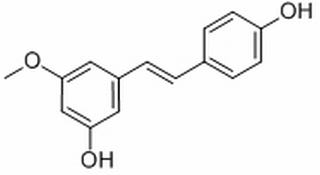Home
Products
Pinostilbene



| Product Name | Pinostilbene |
| Price: | $103 / 10mg |
| Catalog No.: | CN04035 |
| CAS No.: | 42438-89-1 |
| Molecular Formula: | C15H14O3 |
| Molecular Weight: | 242.3 g/mol |
| Purity: | >=98% |
| Type of Compound: | Phenols |
| Physical Desc.: | Powder |
| Source: | The seeds of Vitis riparia. |
| Solvent: | Chloroform, Dichloromethane, Ethyl Acetate, DMSO, Acetone, etc. |
| SMILES: | COc1cc(/C=C/c2ccc(cc2)O)cc(c1)O |
| Contact us | |
|---|---|
| First Name: | |
| Last Name: | |
| E-mail: | |
| Question: | |
| Description | Pinostilbene is a major metabolite of Pterostilbene. Pinostilbene exhibits inhibitory effects on colon cancer cells[1]. |
| In Vitro | Pinostilbene (0- 40 μM; 24 hours, 48 hours) does not cause significant inhibition on the growth of normal colon cells[1]. Pinostilbene (20 μM, 40 μM; 24 hours, 48 hours) causes a significant and dose-dependent increase in the percentage of cells in S phase in both HCT116 and HT29 cells compared to the control cells[1]. Pinostilbene at μM also induces a modest increase of cell population in G2/M phase in HT29 cells[1]. Pinostilbene(20 μM, 40 μM; 24 hours, 48 hours) modulates expression of key signaling proteins related to cell proliferation and apoptosis[1]. Pinostilbene also acts as a resveratrol methylated derivative and displays protective effects against 6-hydroxydopamine-induced neurotoxicity in SH-SY5Y cells[2]. Cell Viability Assay[1] Cell Line: HCT116 cells, HT29 cells Concentration: 24 hours, 48 hours Incubation Time: 0-100 μM Result: Inhibited the growth of two human colon cancer cells. Apoptosis Analysis[1] Cell Line: HCT116 cells, HT29 cells Concentration: 20 μM, 40 μM Incubation Time: 24 hours, 48 hours Result: Caused a significant and dose-dependent increase in the percentage of cells in S phase. Cell Viability Assay[1] Cell Line: HCT116 cells Concentration: 20 μM,40 μM Incubation Time: 24 hours, 48 hours Result: Significantly increased the expression levels of p53, Bax, cleaved caspase-3, cleaved PARP and p21Cip1/Waf1, while decreased the expression levels of cyclin E and p-Rb. |
| Density | 1.3±0.1 g/cm3 |
| Boiling Point | 454.3±33.0 °C at 760 mmHg |
| Flash Point | 228.5±25.4 °C |
| Exact Mass | 242.094299 |
| PSA | 49.69000 |
| LogP | 3.80 |
| Vapour Pressure | 0.0±1.2 mmHg at 25°C |
| Storage condition | 2-8°C |